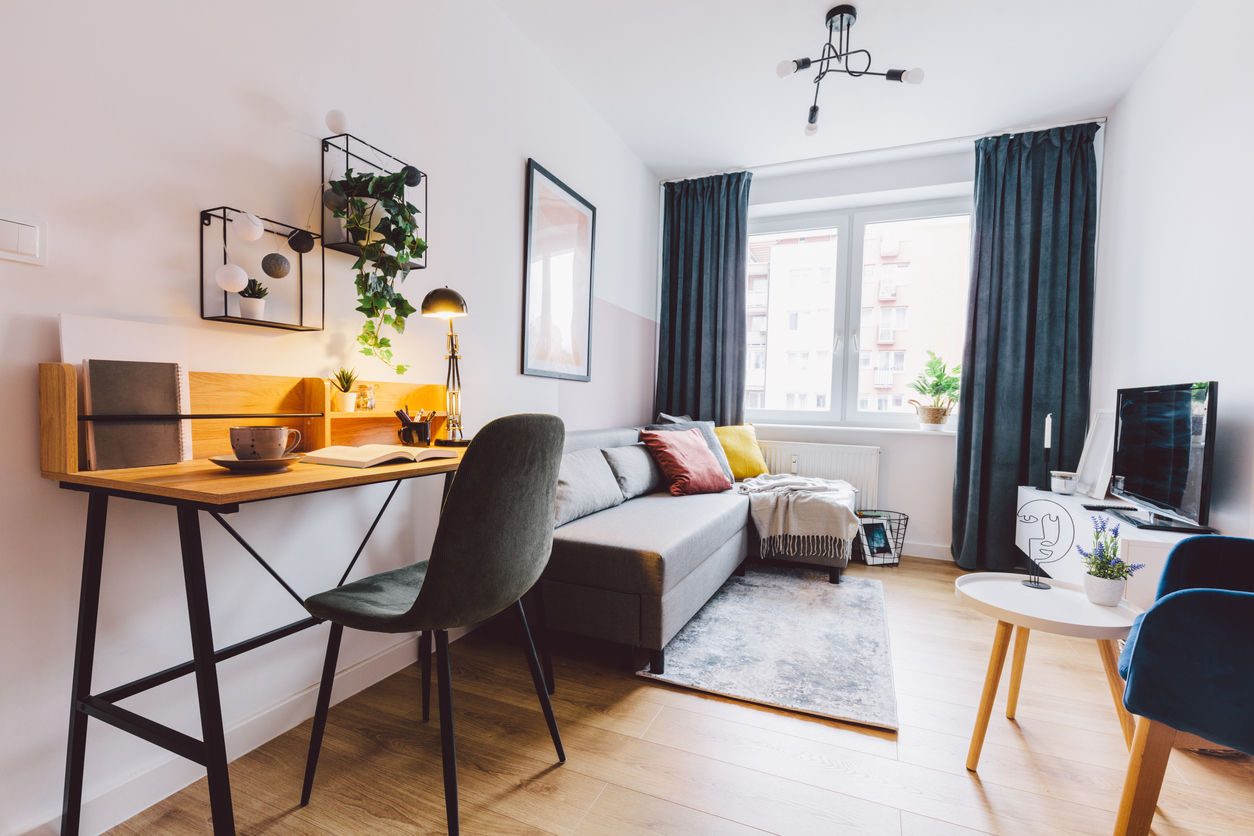- 1. Sell to an investor and become a tenant
- 2. Enter into a home reversion agreement with a lender
- 3. Negotiate with the buyer to stay for a short period of time
- 4. Sell Your Home to a Family Member or Child
- How to Show Your Home to Potential Buyers While Still Living in It
- Find a Real Estate Agent to Help you Understand the Home Selling Process.
Can You Sell Your Home and Still Live in It?
The idea of selling your house and still living in it may seem a little backward—but it is possible!
Most buyers understand how difficult it can be for a seller to relocate or find temporary housing. As a result, they sometimes allow the seller to continue living on the property until the seller can find a new primary residence.
You can continue living on your property after selling it as long as you have an agreement with your buyer explaining how long you’ll be staying and who is responsible for what during that time.
In many cases, both buyer and seller enter into a mutually beneficial agreement. However, it’s important to note that these types of agreements often come with a discounted home sales price.
Buyers often ask for a discount at the time of sale because a seller’s presence on the property limits the buyer’s ability to manage the property independently. This could mean fewer tenants, less rental income, or simply less freedom in terms of what the new owner would like to do with the home.
That being said, if you’re OK with lowering your home’s sale price, selling it while still living in it is a viable option. In this article, we’ll discuss key strategies for selling your current house while living in it and how to show your home to potential buyers without vacating the property.
1. Sell to an investor and become a tenant
Negotiating a leaseback agreement, or a rent-back agreement, is the most common way of remaining on your property after transferring ownership.
A seller leaseback involves selling a home and then renting it from the new owner. When this happens, the seller no longer owns the property but continues to live there for a certain amount of time.
As a result, the seller generates a profit from the home sale while the buyer has a tenant secured immediately after the property is purchased.
This eliminates the possibility of vacant properties, easing investor fears. The rent-back agreement can last just a few months or even a few years, depending on what the seller and buyer decide.
When done correctly, seller leasebacks are mutually beneficial agreements. They’re especially convenient for sellers who can cash out on their home equity without having to spend money moving into a new place.
Seller leasebacks also tend to work well with sellers who are first-time real estate investors looking to fill all the beds in their units as soon as possible and owner-occupied units.
2. Enter into a home reversion agreement with a lender
Another way sellers can remain in their homes after selling is through a home reversion. A home reversion is when a homeowner sells the equity in their home to a lender for a lump sum of cash, a monthly income stream, or a combination of both.
Lenders usually pay for 20-60% of the share you hold in your property. The percentage of equity a lender purchases depends on a variety of factors, such as life expectancy, home appreciation, and general upkeep. Sellers can agree to one of the following kinds of home reversions:
- Full Home Reversion: Full home reversions are ideal for elderly homeowners without heirs, usually those aged 70, or above. This is because lenders intend to take ownership of the home after the termination of a lifetime lease, or when the owner passes away.
- Partial Home Reversion: Partial home reversions work for homeowners who would prefer holding onto at least part of their home’s equity. If you were to enter into a home reversion agreement and then sell the home to a different buyer in the future, the lender would receive a portion of the sales price according to their share of the equity. The rest would be yours.
Home reversions come with several benefits, such as being able to manage living costs, remain in your home long-term, avoid moving stress, and receive tax benefits. However, home reversions also come with a few disadvantages such as:
- Reduced share of equity for your heirs (if you have any).
- Receiving less than full market value for your home at the time of sale.
- Responsibility for maintaining costs of ownership (legal fees, home repairs, and property taxes).
3. Negotiate with the buyer to stay for a short period of time
If you only need to stay for a few weeks or a couple of months while you organize your move, you can simply ask the buyer for permission to stay in exchange for temporary rent, discounted home sale price, or some other arrangement.
In some cases, home buyers may even allow you to stay post-closing at no extra cost. When a buyer rushes to fill a unit with a new tenant, the risk of property damage is high.
Sellers who have an emotional connection with the home are more likely to take care of it during their extended stay than someone who has recently moved into the property.
By allowing the seller to stay as a tenant, new owners buy themselves extra time during which they can properly vet future tenants.
Allowing the seller to stay on the property after closing also makes the buyer’s offer more attractive.
There’s a better chance the seller will accept an offer allowing them to remain on the property at least a few weeks after closing, than an offer that requires them to leave immediately after closing. This makes the overall home buying process easier for buyer and seller.
4. Sell Your Home to a Family Member or Child
Selling your current home directly to a family member or child is another option that allows you to transfer ownership while still living in your transitioning house.
This can be advantageous because you already know and trust the potential buyer who will be owning the property. It also provides an opportunity to keep your home “in the family” lineage if desired.
However, it’s important to take the proper legal steps when selling to a relative as the next homeowner:
- Consult a real estate attorney to draw up a purchase agreement outlining all terms of the sale. This includes purchase price, closing date, who pays closing costs, financing details for the current home and mortgage, etc.
- A real estate appraisal should be conducted to establish a fair market value for home staging and inspection purposes. This prevents claims that the sale was made below value as a gift.
- Consider any tax implications. You may owe capital gains tax on the home’s appreciated value. A real estate accountant can provide guidance.
- Document how existing home equity will be divided or refinanced as part of the sale to the family member.
- Outline any special provisions about the seller still residing in the transitioning home after it’s transferred to the new family owner.
Follow professional legal advice ensures the home sale to a family member or child goes smoothly. Formalize all details in writing before closing.
How to Show Your Home to Potential Buyers While Still Living in It
Now that we’ve discussed various ways in which you can continue living in your home while selling it, here’s what you need to know about showing your home to prospective buyers while living in it:
Display items that are functional, neutral, and clean.
Buyers evaluate your home online before visiting it in person, so make sure to remove any items that are non-essential before taking property photos. Displaying furniture, appliances, and artwork is appropriate as long as these items aren’t outdated or distracting.
It’s best to keep excessive clutter and personal items out of sight. Whatever you do decide to leave out, make sure it’s clean and adds value to your space.
Potential buyers want to feel like they’re making a good investment.
Hide valuable belongings.
In addition to hiding personal items that could distract a prospective buyer from your space, you should also avoid displaying valuable items that could attract the wrong kind of attention.
Anything with special sentimental or monetary value should be locked away in a safe place, either on your property or in a storage unit. Jewelry, important documents, and family heirlooms are all worth safekeeping.
You’ll also want to put away any items with religious or political affiliations. Posters, books, or decor communicating a religious or political message could turn buyers off.
Ultimately, you want them to envision the space as theirs. They won’t be able to do that when strong beliefs they may not share, are on full display during an open house.
Remove pets and all pet-related items.
Lastly, you’ll want to remove your pets and all of their personal items. While many buyers love animals, not all of them do—some are even allergic!
Make sure you accommodate all potential buyers by removing water bowls, litter boxes, and any toys your pets may have. It’s also important to vacuum rugs and in between couches to make sure all pet hair is removed.
Find a Real Estate Agent to Help you Understand the Home Selling Process.
As you can see from the tips mentioned above, selling your home and continuing to live in it is possible. You can accomplish this through a leaseback agreement, home reversion, or simply negotiating with the buyer. As you prepare to sell your home while still living in it, it’s important to declutter, deep clean, and keep valuable items out of reach.
There’s certainly a lot to consider when selling your home with the intent of staying on the property. Reach out to one of the top real estate agents in your area to discuss your selling options today!
The right real estate agent will help you determine if it’s a seller’s market in your area, advise you on which marketing tool to use, and help you find professional stagers for your property.
Most importantly, they’ll be able to help you find a buyer that is willing to let you live on the property after closing.





